1998 CHEVROLET VENTURE air conditioning
[x] Cancel search: air conditioningPage 220 of 474
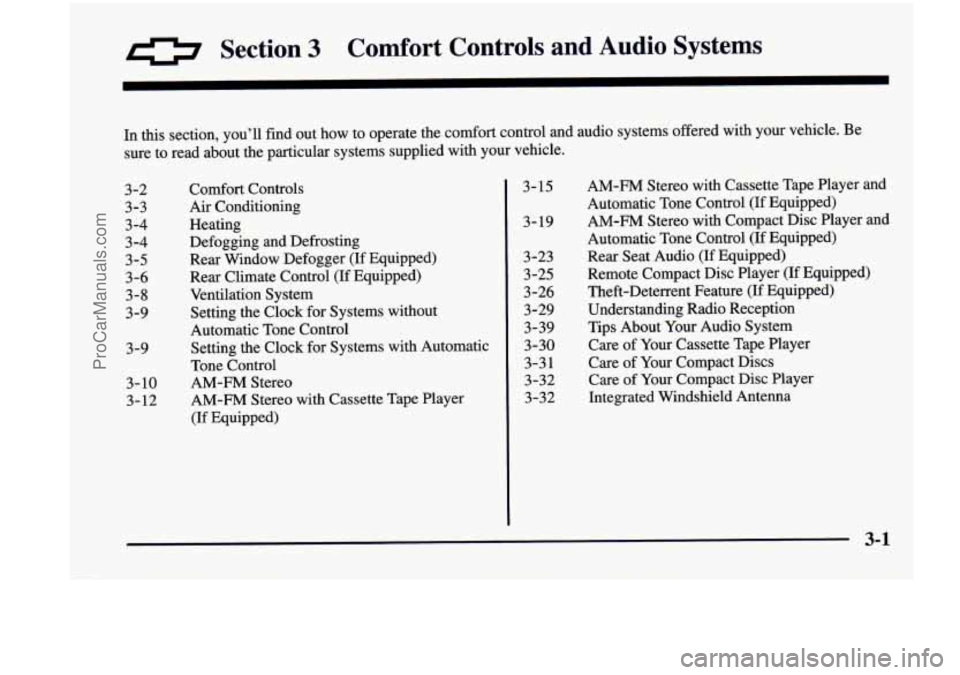
0 Section 3 Comfort Controls and Audio Systems
In this section, you’ll find out how to operate the comfort control and audio systems offered with your vehicle. Be
sure to read about the particular systems supplied with your vehicle.
3-2 3-3
3-4
3-4
3-5
3-6
3-8
3-9
3-9 3- 10 3-12 Comfort
Controls
Air Conditioning
Heating Defogging and Defrosting
Rear Window Defogger (If Equipped)
Rear Climate Control (If Equipped)
Ventilation System
Setting the Clock for Systems without
Automatic Tone Control
Setting the Clock for Systems with Automatic
Tone Control
AM-FM Stereo
AM-FM Stereo with Cassette Tape Player
(If Equipped) 3-15
3- 19 3-23 3-25
3
-26
3-29
3-39
3-30
3-3 1
3-32
3-32
AM-FM Stereo with Cassette Tape Player and
Automatic Tone Control (If Equipped)
AM-FM Stereo with Compact Disc Player and
Automatic Tone Control
(If Equipped)
Rear Seat Audio
(If Equipped)
Remote Compact Disc Player (If Equipped)
Theft-Deterrent Feature
(If Equipped)
Understanding Radio Reception
Tips About Your Audio System
Care of Your Cassette Tape Player
Care
of Your Compact Discs
Care
of Your Compact Disc Player
Integrated Windshield Antenna
3-1
ProCarManuals.com
Page 221 of 474
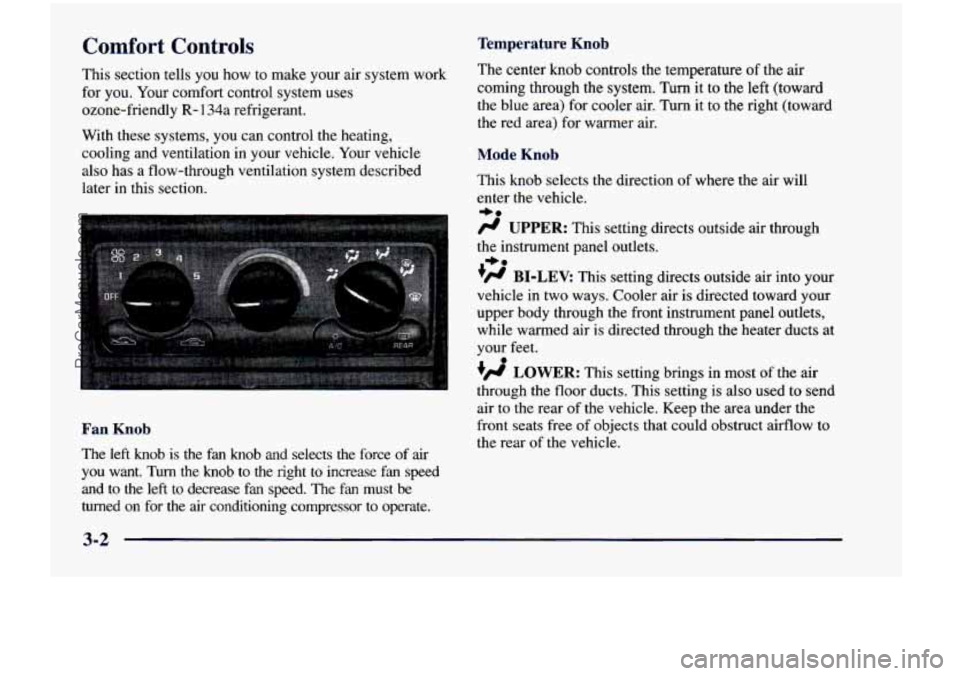
Temperature Knob Comfort Controls
This section tells you how to make your air system work
for
you. Your comfort control system uses
ozone-friendly
R- 134a refrigerant.
With these systems,
you can control the heating,
cooling and ventilation
in your vehicle. Your vehicle
also has a flow-through ventilation system described
later
in this section. The
center
knob controls the temperature of the air
coming through the system. Turn it to the left (toward
the blue area) for cooler air. Turn it to the right (toward\
the red area) for warmer air.
Mode Knob
This knob selects the direction of where the air will
enter the vehicle.
-be
fl UPPER: This setting directs outside air through
the instrument panel outlets.
+fl BI-LEV: This setting directs outside air into your
vehicle in two ways. Cooler air
is directed toward your
upper body through the front instrument panel outlets,
while warmed air
is directed through the heater ducts at
your feet.
+e
0
+fl LOWER: This setting brings in most of the air
air to the rear of the vehicle. Keep the area under the
the rear of the vehicle.
- through the floor ducts. This setting is also used to send
Fan Knob front seats free of objects that could obstruct airflow to
The left knob is the fan knob and selects the force of air
you want. Turn the knob to the right to increase fan speed
and to the left to decrease
fan speed. The fan must be
turned on for the
air conditioning compressor to operate.
3-2
ProCarManuals.com
Page 222 of 474
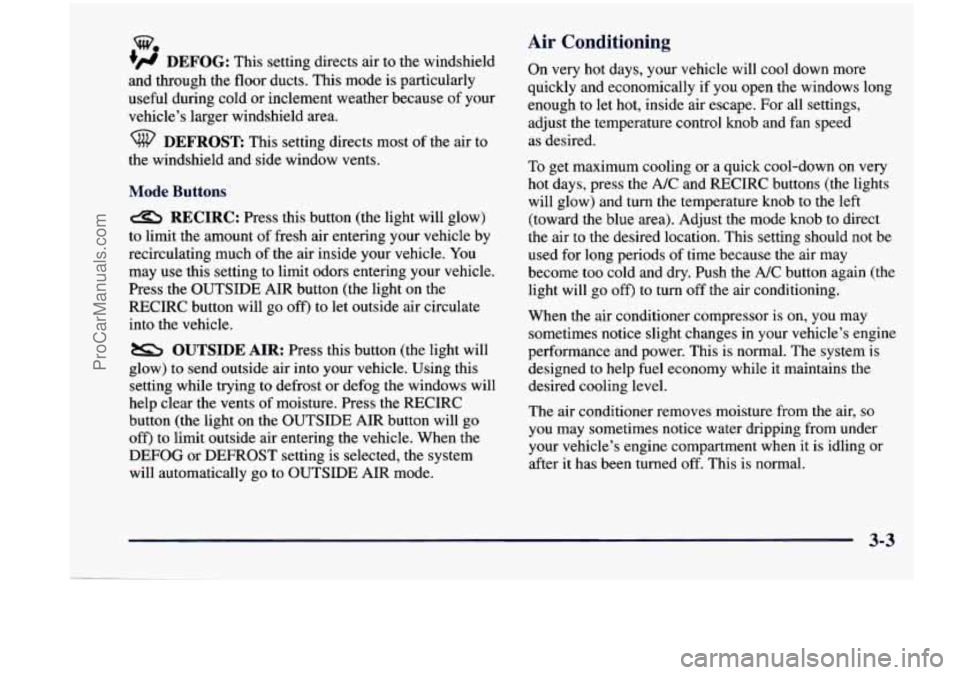
w.
+# DEFOG: This setting directs air to the windshield
and through the floor ducts. This mode is particularly
useful during cold or inclement weather because of your
vehicle’s larger windshield area.
the windshield and side window vents.
DEFROST: This setting directs most of the air to
Mode Buttons
e RECIRC: Press this button (the light will glow)
to limit the amount
of fresh air entering your vehicle by
recirculating much of the air inside your vehicle. You
may use this setting to limit odors entering your vehicle.
Press the OUTSIDE AIR button (the light on the RECIRC button will go
off) to let outside air circulate
into the vehicle.
OUTSIDE AIR: Press this button (the light will
glow) to send outside air into your vehicle. Using this
setting while trying to defrost or defog the windows will
help clear the vents of moisture. Press the RECIRC
button (the light on the
OUTSIDE AIR button will go
off) to limit outside air entering the vehicle. When the
DEFOG
or DEFROST setting is selected, the system
will automatically go to OUTSIDE AIR mode.
Air Conditioning
On very hot days, your vehicle will cool down more
quickly and economically if you open the windows long
enough to let hot, inside air escape. For all settings,
adjust the temperature control knob and fan speed
as desired.
To get maximum cooling or a quick cool-down on very
hot days, press the A/C and RECIRC buttons (the lights
will glow) and turn the temperature knob to the left
(toward the blue area). Adjust the mode
knob to direct
the air to the desired location. This setting should not be
used for long periods
of time because the air may
become too cold and dry. Push the A/C button again (the
light will go off) to turn
off the air conditioning.
When the air conditioner compressor is on, you may sometimes notice slight changes
in your vehicle’s engine
performance and power. This is normal. The system
is
designed to help fuel economy while it maintains the
desired cooling level.
The air conditioner removes moisture from the air,
so
you may sometimes notice water dripping from under
your vehicle’s engine compartment when it is idling or
after it has been turned off. This is normal.
3-3
ProCarManuals.com
Page 336 of 474

Section 6 Service and Appearance Care
Here you will find information about the care of your vehicle. This section begins with service and fuel information,
and then it shows how to check important fluid and lubricant levels. There is also technical information about your
vehicle, and
a part devoted to its appearance care.
6- 18
6-2 1
6-24
6-25
6-26
6-30
6-3
1
6-39 6-2
Service
6-3 Fuel
6-7 Filling a Portable Fuel Container
6-
8 Checking Things Under the Hood
6-11 Engine Oil
6-15 Air Cleaner
6-16 Passenger Compartment Air Filter
Replacement
Automatic Transaxle Fluid
Engine Coolant
Radiator Pressure Cap
Windshield Washer Fluid
Brakes
Battery
Bulb Replacement
Windshield Wiper Blade Replacement 6-40
6-48
6-48
6-52
6-54
6-54
6-55
6-56
6-57
6-64
6-65
6-65
6-66
6-66
6-66 Tires
Appearance
Care
Cleaning the Inside of Your Vehicle
Cleaning the Outside of Your Vehicle
Underbody Maintenance Chemical Paint Spotting
Appearance Care Materials Chart
Vehicle Identification Number (VIN)
Electrical System
Replacement Bulbs
Capacities and Specifications
Engine Specifications
Vehicle Dimensions
Normal Maintenance Replacement Parts
Air Conditioning Refrigerants
ProCarManuals.com
Page 400 of 474
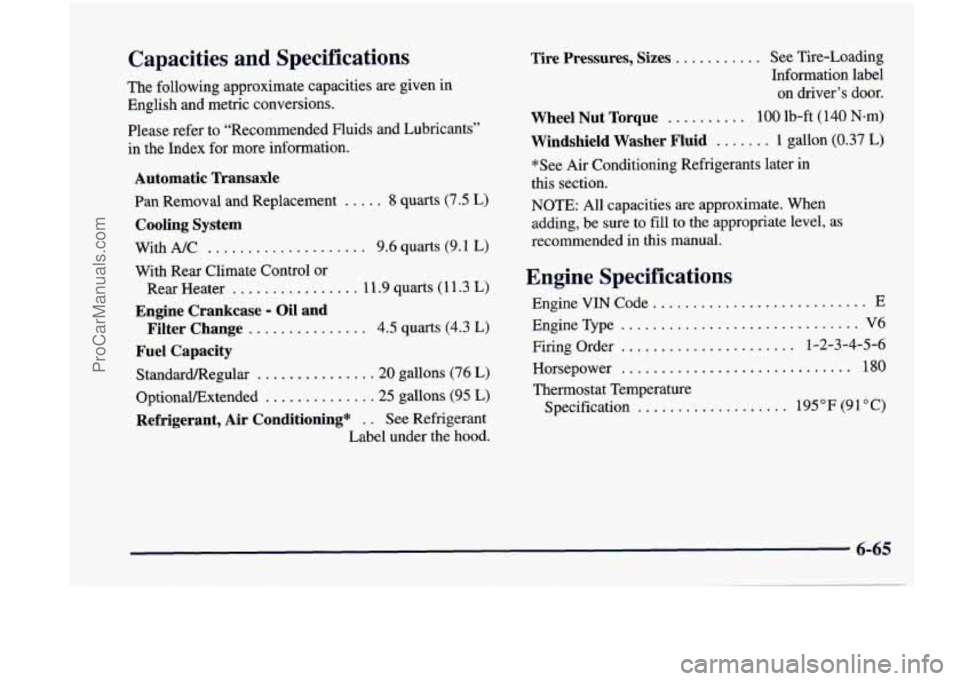
Capacities and Specifications
The following approximate capacities are given in
English and metric conversions.
Please refer to “Recommended Fluids and Lubricants”
in the Index for more information.
Automatic Transaxle
Pan Removal and Replacement ..... 8 quarts (7.5 L)
Cooling System
With A/C .................... 9.6 quarts (9.1 L)
With Rear Climate Control or
Engine Crankcase - Oil and
Fuel Capacity
Rear Heater ................ 11.9 quarts (11.3 L)
Filter Change ............... 4.5 quarts (4.3 L)
StandardRegular .............. .20 gallons (76 L)
OptionaVExtended ............. .25 gallons (95 L)
Refrigerant, Air Conditioning* . . See Refrigerant
Label under the hood.
Tire Pressures, Sizes ........... See Tire-Loading
Information label
on driver’s door.
Wheel Nut Torque .......... 100 lb-ft (140 N-m)
Windshield Washer Fluid ....... 1 gallon (0.37 L)
*See Air Conditioning Refrigerants later in
this section.
NOTE: All capacities are approximate. When
adding,
be sure to fill to the appropriate level, as
recommended in
this manual.
Engine Specifications
Engine VIN Code ........................... E
Firing Order ...................... 1-2-3-4-5-6
EngineType
.............................. V6
Horsepower ............................. 180
Thermostat
Temperature
Specification
................... 195 “F (91 “C)
6-65
ProCarManuals.com
Page 401 of 474

I.’ *
Vehicle Dimensions - Regular
Wheel Base
Length ................. 186.9 inches (474.6 cm)
Width
...................... 72 inches (1 83 cm)
Height
................... 67.4 inches (1 7 1.2 cm)
Wheelbase
................ 112 inches (284.5 cm)
Front Tread Width
......... 6 1.5 inches (1 56.2 cm)
Rear Tread Width
.......... 63.3 inches ( 160.8 cm)
Vehicle Dimensions - Extended
Wheel Base
Length ................. 200.9 inches (510.2 cm)
Width
...................... 72 inches (183 cm)
Height
................... 68.1 inches (1 72.9 cm)
Wheelbase
................ 120 inches (304.7 cm)
Front Tread Width
......... 61.5 inches (156.2 cm)
Rear Tread Width
.......... 63.3 inches (160.8 cm)
Normal Maintenance Replacement Parts
Air Cleaner Filter ............. AC Type A- 1208C
Engine Oil Filter
........................ PF47
Spark Plugs
................... AC Type 41-940
Passenger Compartment Air Filter (2)
.... 52470574
Gap:
0.060 inches (1.5 mm)
Windshield Wiper Blades Length
..................... 24 inches (60 cm)
Type
......................... Shepard’s Hook
Length .................... 16 inches (40.6 cm)
Type
......................... Shepard’s Hook
Backglass Wiper Blade
Air Conditioning Refrigerants
Not all air conditioning refrigerants are the same.
If the
air conditioning system in your vehicle needs
refrigerant, be sure the proper refrigerant
is used. If
you’re not sure, ask your dealer.
ProCarManuals.com
Page 436 of 474
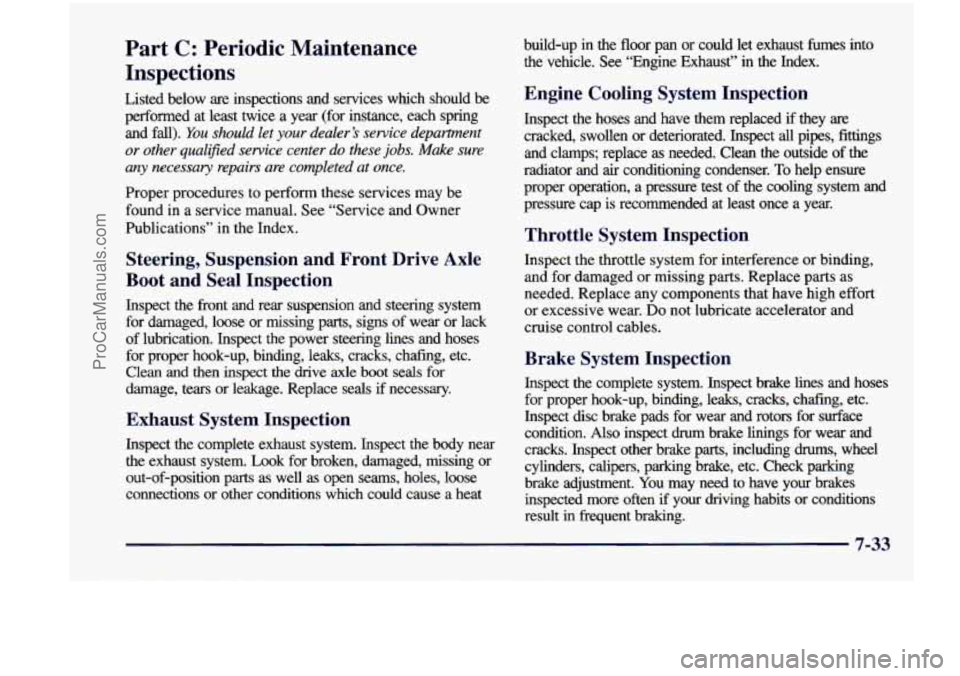
Part C: Periodic Maintenance
Inspections
Listed below are inspections and services which should be
performed at least twice a year (for instance, each spring
and fall).
You should let your dealer’s service department
or other qualijied service center do these jobs. Make sure
any necessary repairs are completed at once.
Proper procedures to perform these services may be
found in a service manual. See “Service and Owner
Publications” in the Index.
Steering, Suspension and Front Drive A: 3
Boot and Seal Inspection
Inspect the front and rear suspension and steering system
for damaged, loose or missing parts, signs
of wear or lack
of lubrication. Inspect the power steering lines and hoses
for proper hook-up, binding, leaks, cracks, chafing, etc.
Clean and then inspect the drive axle boot seals for
damage, tears or leakage. Replace seals if necessary.
Exhaust System Inspection
Inspect the complete exhaust system. Inspect the body near
the exhaust system.
Look for broken, damaged, missing or
out-of-position parts as well as
open seams, holes, loose
connections
or other conditions which could cause a heat build-up in the floor pan or could let exhaust fumes into
the vehicle. See “Engine Exhaust”
in the Index.
Engine Cooling System Inspection
Inspect the hoses and have them replaced if they are
cracked, swollen or deteriorated. Inspect
all pipes, fittings
and clamps; replace
as needed. Clean the outside of the
radiator and air conditioning condenser. To help ensure
proper operation, a pressure test
of the cooling system and
pressure cap is recommended at least once a year.
Throttle System Inspection
Inspect the throttle system for interference or binding,
and for damaged or missing parts. Replace parts as
needed. Replace
any components that have high effort
or excessive wear.
Do not lubricate accelerator and
cruise control cables.
Brake System Inspection
Inspect the complete system. Inspect brake lines and hoses
for proper hook-up, binding, leaks, cracks, chafing, etc.
Inspect disc brake pads for wear and rotors for surface
condition.
Also inspect drum brake linings for wear and
cracks. Inspect other brake parts, including
drums, wheel
cylinders, calipers, parking brake, etc. Check parking
brake adjustment. You may need to have your brakes
inspected more often if your driving habits or conditions
result in frequent braking.
- mm 7-53
ProCarManuals.com
Page 458 of 474
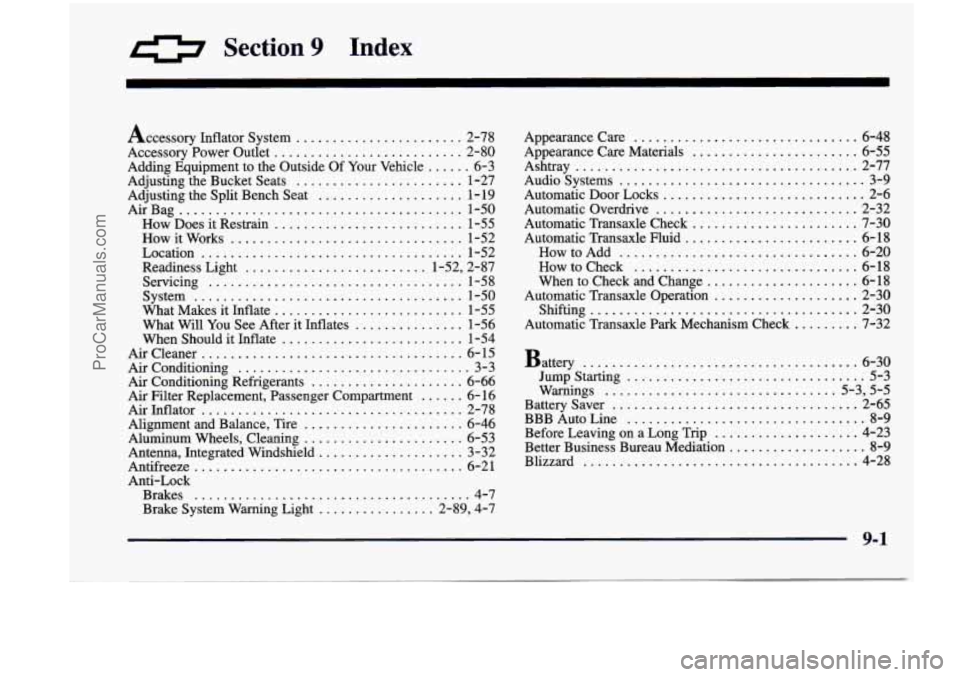
0 Section 9 Index
Accessory Inflator System ....................... 2-78
Accessory Power Outlet
.......................... 2-80
Adding Equipment to the Outside Of Your Vehicle
...... 6-3
Adjusting the Bucket Seats
....................... 1-27
Adjusting the Split Bench Seat
.................... 1- 19
Air Bag
....................................... 1-50
How Does it Restrain
.......................... 1-55
Howitworks
................................ 1-52
Location
.................................... 1-52
Readiness Light
......................... 1.52. 2.87
Servicing
................................... 1-58
System
..................................... 1-50
What Makes it Inflate
.......................... 1-55
What Will You See After
it Inflates ............... 1-56
When Should
it Inflate ......................... 1-54
Aircleaner
.................................... 6-15
Air Conditioning
................................ 3-3
Air Conditioning Refrigerants
..................... 6-66
Air Filter Replacement. Passenger Compartment ...... 6-16
AirInflator
.................................... 2-78
Alignment and Balance. Tire
...................... 6-46
Aluminum Wheels. Cleaning
...................... 6-53
Antenna. Integrated Windshield
.................... 3-32
Antifreeze
..................................... 6-21
Anti-Lock Brakes
...................................... 4-7
Brake System Warning Light
................ 2-89, 4-7 Appearance Care
............................... 6-48
Appearance Care Materials
....................... 6-55
Ashtray
....................................... 2-77
Audio Systems
.................................. 3-9
Automatic Door Locks
............................ 2-6
Automatic Overdrive
............................ 2-32
Automatic Transaxle Check
....................... 7-30
Automatic Transaxle Fluid
........................ 6-18
Howtocheck
............................... 6-18
When to Check and Change
..................... 6-18
Automatic Transaxle Operation
.................... 2-30
Shifting
..................................... 2-30
Automatic Transaxle Park Mechanism Check
......... 7-32
Battery
...................................... 6-30
Jump Starting
................................. 5-3
Warnings
................................ 5.3. 5.5
BatterySaver .................................. 2-65
BBB Auto Line
................................. 8-9
Before Leaving on a Long Trip
.................... 4-23
Better Business Bureau Mediation
................... 8-9
Blizzard
...................................... 4-28
HOW to
Add
................................. 6-20
9-1
ProCarManuals.com